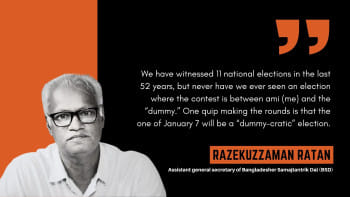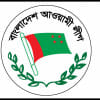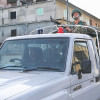‘Even before the election, there is no question as to who the elected will be.’

By now, it is clear that the election this time around will be a one-sided affair. Not only the ruling party candidates, but those from the official opposition and other parties, and even the independents, are all AL-approved.
In Bangladesh, candidates are elected to the parliament for the purposes of formulating legislation and maintaining the state apparatus. Our constitution mandates competitive elections. The various political parties can present their ideologies and the people can elect their favourite. However, if the election does take place on January 7 with things going as they are, the one-party mindset of the ruling party will be out in the open for all to see. Right now, the question being asked at home and abroad is: who will be the opposition? But even before the election, there is no question as to who the elected will be. In fact, everyone believes that wondering about this is foolish.
The event that we will be calling an election may be legally legitimate if at least one percent of voters cast their say, as the Election Commission—which seems to do as the government says—has said. However, such an election will not be morally valid, and this will be the first crisis we'll encounter once it's over. The second post-election crisis will be the clashes between local factions of the same party. Thirdly—and even the government hasn't denied this—an economic crisis is coming our way. In any country, collective efforts are needed to encounter an economic crisis. But this cannot happen when political conflicts of the scale we are seeing are allowed to fester.
I predict that, while conflicts within the country will only intensify in the near future, this will also result in more interference from foreign powers in the forms of conditionalities and sanctions.
At this moment, not only can we assume that political instability will worsen, but we know that if the ruling party wins the upcoming election, it will feel more empowered to employ authoritarian and undemocratic ways of holding on to the throne. The control over politics in the country is in the hands of those who will only do ill.
The situation that the country is facing is an unfortunate one. But there is still time. As our experts have said, the solution could be found in our own constitution: by cancelling the election schedule, dissolving the parliament, and then holding a participatory election. One has to agree that there cannot be a fair election under the ruling party. As such, a system should be put in place where an election-time government oversees the polls and hands over power to the winning party. This would also eliminate the apprehension some hold regarding a caretaker government refusing to give up power. If we had a democratic party at the front, perhaps such ideas could reach fruition. Still, we have to urge the ruling party to go for such a system. And if it still keeps fending off this idea, it would make sense for the people to not visit the polling centres on election day. This would be a silent protest, conveying that the people do not approve of the ruling party's behaviour nor of the immense conflicts that will ensue following such an election.
Ruhin Hossain Prince is general secretary of Communist Party of Bangladesh.
Views expressed in this article are the author's own.
Follow The Daily Star Opinion on Facebook for the latest opinions, commentaries and analyses by experts and professionals. To contribute your article or letter to The Daily Star Opinion, see our guidelines for submission.

 For all latest news, follow The Daily Star's Google News channel.
For all latest news, follow The Daily Star's Google News channel. 










Comments